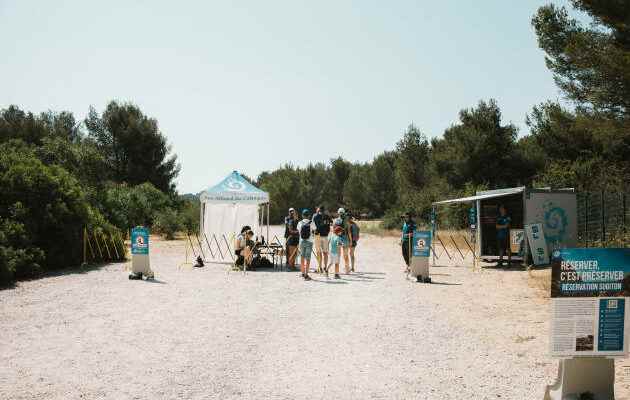“To reserve is to preserve”. The slogan, on a turquoise blue sea background, is displayed in Marseille and around its famous Calanque de Sugiton, but Nathan and Louis (who did not wish to give their names) did not see it. By booking, the two students would have preserved their calves: for lack of a ticket, it is only by borrowing “pirate paths through the garrigue” and at the cost of a few scratches they found Sugiton.
Access to the sublime calanque is, since the summer of 2022, limited to 400 visitors per day. During the last Ascension weekend, a counter had counted 3,000 in this tiny cove surrounded by steep rocks. Far too much for its scrubland, its soil and its pines, whose roots are trampled each year by more footings. Lately, the descending path has deteriorated to the naked eye, judge Nicolas Chardin, the acting director of the national park of the creeks. This is the site subject to a daily quota, like the island of Porquerolles (Var) or the Lavezzi Islands, off Bonifacio (Corsica).
Reserving natural sites free of charge to protect them from overtourism: these firsts in France, which put environmental protection ahead of freedom of movement, are part of a general trend towards the reservation of tourist activities − popular restaurants, museums and famous monuments or even a city like Venice, which claims to set it up, but still backs away from the obstacle. Didier Réault, the president of the national park, describes “a visit permit to see a natural work, as one reserves to admire a cultural work in a museum”. At the risk of excluding part of the population and destroying any form of improvisation.
Nathan and Louis, the two offenders, see ” advantages and disadvantages “ : among the first, the tranquility of the swimmer and the absence of waste. But “organize in advance”, in competition with tourists, is binding. Reservations are open three days before, at 9 a.m., in order to maintain a healthy competition between locals and visitors. At midday, the 400 places are usually sold out. After a week, Rodrigue, the colossus of the security company that checks QR codes, finds visitors “more understanding than at the beginning”although some locals try to test the solidity of the device or the determination of the goalkeeper, with dissuasive biceps.
This Monday, July 18, bathers are inevitably delighted with the experience, since we find a place in the shade and we no longer queue to jump off the rocks. The measure, announced a year ago, was unanimously adopted by the board of directors of the Calanques National Park, and in particular by the various communities. The information has not reached foreign tourists, more numerous since the creation, in 2012, of a national park – a classification which reinforces the means of protection, but also the tourist attractiveness of the places.
You have 62.32% of this article left to read. The following is for subscribers only.
